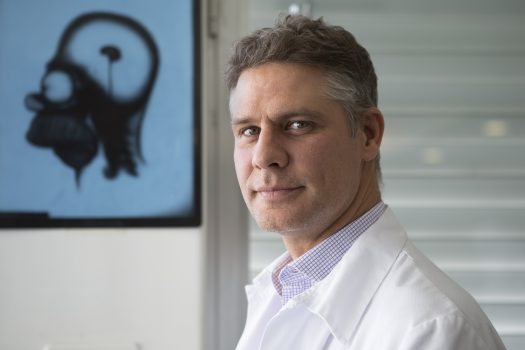
Philippe Bijlenga
Nom du groupe: Cerebral Ischemia
Affiliations: Faculty of Medicine, Geneva University Hospitals, Department of Clinical Neurosciences
Domaines: Development and Plasticity
Mot clés: calcium signaling, cerebral ischemia, stroke
Activités de recherche
The interest of the laboratory is focused on stroke. Cerebral ischemia induces a significant early and sustained increase of the intracellular calcium concentration. It also has been observed that an increase of intracellular calcium lasting long enough could trigger delayed neuronal death. Preventing the intracellular calcium increase during an ischemic insult by reducing the extracellular calcium concentration prevents delayed neuronal death. The research in the laboratory is therefore focused on understanding the alteration of intracellular calcium signaling during an ischemic insult. The effort is currently concentrated on understanding the implication of a specific type of voltage-activated calcium channel present on the plasma membrane during ischemia. Neuronal ischemia is studied on three different models. Electrophysiology and calcium imaging is performed on dissociated neuronal cultures during ischemic insults. Pharamacology and neuroprotection studies are performed first in an in vitro model with organotypic hippocampal slice cultures and then in an in vivo model of global ischemia in rats.
Dernières publications
Enhanced intracranial aneurysm development in a rat model of polycystic kidney disease.
Surgical and clinical impacts of mixed reality-guided glioblastoma resection versus standard neuronavigation: improving tumor surgery.
Brain surgery with safe intraoperative 3-T MRI and neuromonitoring.
Safety of flow-controlled ventilation with positive and negative end-expiratory pressure in a swine model of intracranial hypertension.
Contact
Departement des neurosciences cliniques
HUG
Email: Philippe.Bijlenga@hcuge.ch